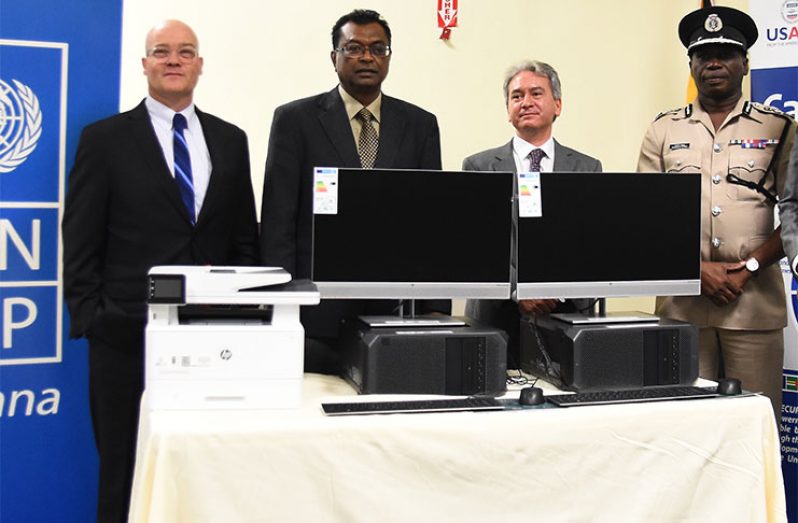— 30 officers to be trained in initial pilot project
A PILOT project on two police stations will soon see the transition of paper-based reporting to a digital format where real-time data on incidents reported can produce more standardised and accurate crime data.
This was disclosed at the official launch of the Police Records Management Information System (PRMIS) on Thursday at the Guyana Police Force (GPF) Training Centre, Camp Road, Georgetown.
The United States Agency for International Development (USAID), in collaboration with the United Nations Development Programme (UNDP) and the GPF, launched the automated PRMIS system.
A two-day training exercise will follow the PRMIS launch where 30 officers from the pilot station and other critical GPF units are expected to benefit from hands-on familiarisation with the new application, a crucial element to a successful pilot.
According to Public Security Minister, Khemraj Ramjattan, the launch marked the official handover of computer hardware and software to the GPF to support the implementation of key activities under USAID’s CariSECURE project.
He said the system is being piloted at the Fort Wellington and Alberttown Police Stations.
According to Ramjattan, the police will gain vital intelligence on crime hot spots along with ‘persons of interest’, including their traits and crime footprint.
Shortly, he said citizens can expect improved efficiency as the system eliminates the need for multiple crime incidence reports.
According to the minister, victims and witnesses will have the capacity to provide more detailed accounts to support investigators with closing cases quickly and efficiently.
Further, he said the system will also allow other agencies in the justice system to share crime data among themselves by opening up communication channels.
Additionally, Ramjattan noted that government will assess the system’s use in the pilot police stations to inform its rollout to all police stations in the future.
Once Guyana is fully under the digital system, he said better targeting of hot-spots and complete country profiles can be rapidly created to inform responses.
The public security minister noted that the information can also be shared across the region to address trans-national crimes and allow for broad learning from Guyana’s neighbours.
CRIME REDUCTION
UNDP resident representative, Luca Renda, said the primary objective is aimed at crime reduction in the reliability and use of data while promoting the use of information management systems.
He said a similar initiative is being implemented in Central America since Latin America and the Caribbean remains the most violent regions in the world.
“Effectively addressing crime requires an integrated approach that enlists the collaboration of many government entities and agencies, but the police are at the forefront of this endeavour,” the UNDP representative said.
He explained that it is critical for the police to be equipped with all the tools required to be effective in the fight against crime, including modern information technology.
US Deputy Chief of Mission, Mark Cullinane, said criminals become savvier worldwide and thanks to information technology, it becomes more imperative for law enforcement officials to make more clever use of technology to optimise their work.
He said access to real-time and disaggregates crime data is essential, and as such, data will equip police with the ability to conduct crime hot spot mapping, victim and offender profiling and intelligence gathering.
The Deputy Chief of Mission said PRMIS will advance the GPF into 21st century policing, which shifts the police away from paper-based crime recording, resulting in greater efficiency through customized and digitised reporting processes.
Cullinane said as important as the installation, its maintenance is equally important and the Guyana government, the regional security system and CARICOM Impacts plan to jointly share the responsibility.
“We look forward to hearing about the outcomes of the new system in Alberttown and Fort Wellington Police Stations and the expansion across all police stations in the near future. I am confident that these systems will be effective in more national policies and approaches to violence and crime in a more safer and prosperous Guyana,” the deputy chief of mission said.
CariSECURE will be implemented in 10 Southern and Eastern Caribbean countries, with specific emphasis on Guyana, Saint Kitts and Nevis and Saint Lucia.
It is expected that by 2020, target countries will be using evidence-based decision-making to develop and approve policies and programmes supported with national budgetary allocations, which effectively target youth crime and violence risk factors, thereby contributing to a reduction of youth involvement in crime and violence.



.jpg)









